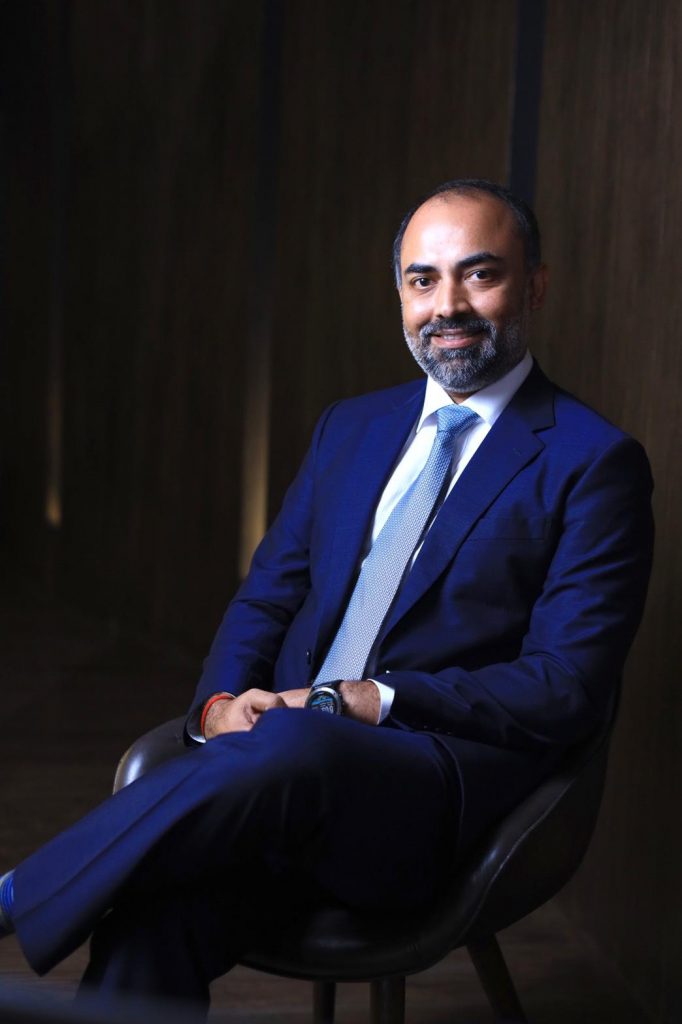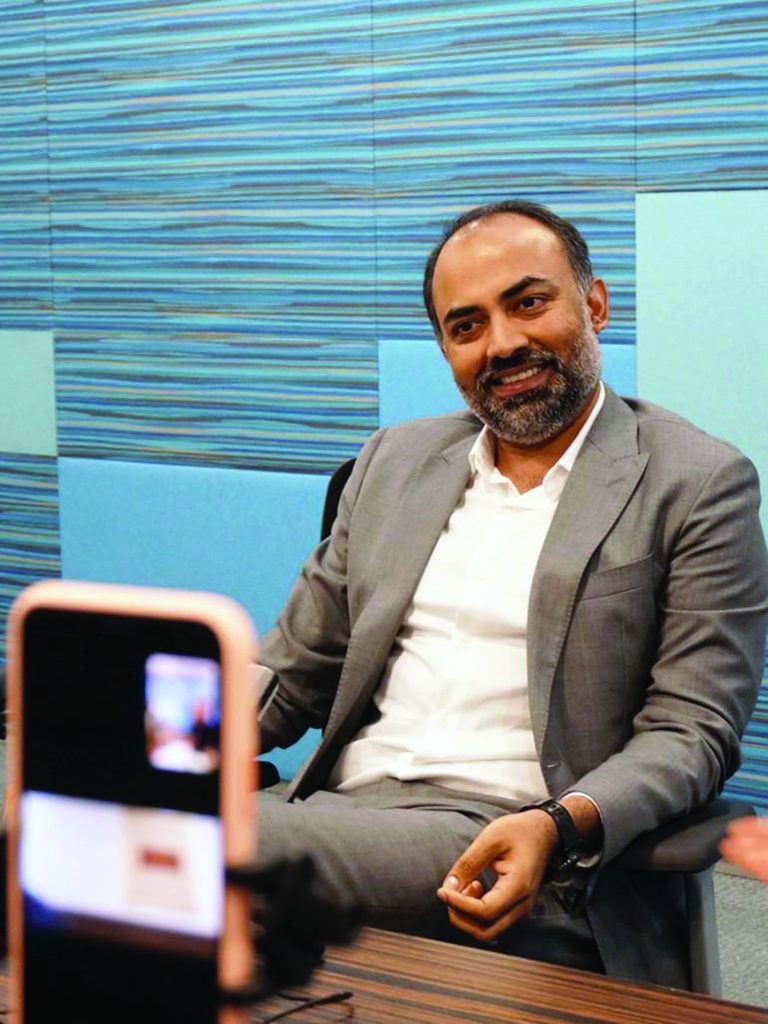The importance of personal connections, innovation, and giving credit where it’s due.
By Aiden Jewelle Gonzales
If there’s someone who understands appreciation, it’s Pratik Bhattacharjee, and not just in the financial field. Despite his lauded career in various roles and geographies – in Delhi, Chennai, Mumbai, Singapore, Russia and now as the Director & Head of Credit Cards & Personal Loans at Citi Thailand – he remains excited about every opportunity that comes his way, both professional and personal. “If there are two things that really excite me, it’s new cultures, and new initiatives,” he tells me as he gives a candid account of what led him here, as one of the country heads of one of the nine investment banks in the Bulge Bracket, a list of the world’s largest multi-national investment banks.
Born in Calcutta, India, Pratik always had his sights set on finance, graduating with a BSc in Economics from St. Xavier’s College, and a Master’s in Quantitative Economics from the Indian Statistical Institute. “I started my career in risk management for American Express, and spent a bit of time in New York understanding that,” he recalls. “After that, I rotated across various functions in the payment industry – from risk management, to data science, to strategy – and as a result, I grew into the payments and lending space. The natural progression would have been to head a business in an organisation like this, which is what I did in Russia; a similar role to the one I have here in Thailand.” Through most of his career, he’s been a stalwart supporter of, and loyal to, Citigroup, which he first joined in India 15 years ago, and he’s remained appreciative of the enrichment and experience that he’s gained in the field. “I first joined them because they were a renowned organisation, and I had some close friends in the company,” he says, “but I stayed because it’s a great organisation that really takes care of its talent, and there’s never an opportunity for life to be boring. There’s always a challenge waiting for me, whether it was moving across functions or geographies.”
Part of that challenge was moving to Thailand to head Citi in the midst of the COVID-19 pandemic, and dealing with the accelerated move into the digital payments space that resulted from the various lockdowns in the country, and worldwide. When I ask him about what drew him here, and the unique opportunities that Thailand provides in this industry, he extols the virtues of Thailand’s emerging market, and the growth of the Asia Pacific region. “While there have been difficulties over the last year or so, with external factors like COVID, Thailand and its people have been resilient enough to manage that,” he said. “On top of that, my team here is fantastic, and I think any team is a reflection of the people in the country itself. Thailand has been very welcoming, not just to the new initiatives that I’ve introduced in Citi, but to myself and my family, personally. There’s always been a certain draw to moving to the Land of Smiles, and so far it’s been an incredibly enriching experience. It’s also been great to see the strong and tight-knit community of Indians here, who are always there for each other, and that’s something that I really appreciate, despite my diverse slate of friends here, from all walks of life.”
As for the dual hurdles of assimilating into a new culture and dealing with the changes that the pandemic has wrought, I realise that this is where he truly shines. “Wherever I go, there’s always been a vast difference in cultures – from India, to Singapore, to Thailand, I always take it as a personal challenge to assimilate myself well. I like to believe that people are one of my strengths, and It’s something that I believe in – staying connected with my team, and with the industry. I think that is paramount in being a good leader and guiding others, and that’s something that I’m working on, because you don’t just lead a business, you lead a team.”
It’s this insistence on keeping his finger on the pulse of the industry that has allowed Pratik to bring new initiatives to Citi Thailand during the recent drive into the digital payments space. “Wherever I go, I like to try various new things from a business point of view,” he says. “In the last two quarters or so, my team and I have launched things like our iPhone for Life (buy back programme), which we were the first to do in the market here; we also have the first cashline product that can be used to top up your TrueMoney Wallet; we’ve partnered with the likes of LINE and even Grab, where we’re exchanging points. It’s exciting to bring new things to the market and to be the industry first in a lot of these initiatives, and part of that is recognising the importance of the tech space, and partnering with the leading companies therein.”
I point out that it’s been a very interesting time in finance, with the rise of innovation in fintech and digital loan technology, and he concurs. “This last year or so, people have really moved towards the online space, so that sector has been excellent for us, as we do want to launch products that are more convenient to the customer.” As someone who has been in finance for over a decade, I ask him about how he’s coped with the ever-shifting financial landscape, and how other established brands in finance need to evolve. “Obviously every financial crisis has some changes that it’s brought about,” he reflects.
“The payments industry has evolved by leaps and bounds, and we need to keep up with that. Earlier it was more cash, then it became credit cards, now it’s QR codes, while faster payments have evolved tremendously. The second thing that has changed is that over the years, there’s a lot that has happened in terms of customer focus and market conduct, and rightfully so. The element of financial prudence is baked into every single product now.”
I would have been remiss in not taking that opportunity to ask him about the ballooning individual and household debt in Thailand, which has only been exacerbated by the pandemic, as well as Thailand’s dependence on instalment plans and short-term loans, as seen by the 40 percent rise in credit cards in the country between 2010-2016 alone. “This is not only unique to Thailand but across many markets, especially during this difficult time,” he says, with regret. “Either way, responsible finance is something that I do promote and condone, especially as the entire business of credit cards in Citi Thailand falls under my management, as well as the sizeable business of personal loans. Financial prudence is something that we’ve always been vigilant about at Citi, and in recent times, it’s become even bigger and broader in market conduct and market perspective, with more regulations geared towards it.” As for his personal advice in that field? “Everyone should be looking at their expenses in a way that fits their lifestyle, but is also commensurate to the overall funds that they have. We do want to help customers and to facilitate expense, but keeping in mind that our products are for day-to-day use, and not for increasing of indebtedness.”
Finally, I ask him how he’s remained so sanguine despite all the changes in the financial industry and the frenetic pace of the digital payments race, and he advises me on the importance of finding that equilibrium. “It’s a demanding career, no doubt about it, but I’ve found time to put an element of my passions in all my vacations,” he says.
“For example, I like to do half marathons, and even two weeks ago, I was in Pattaya participating in a triathlon. That’s something that I do outside of work; I try to find at least one hour in the day to train, and then I spend time with the family in the evening. At the end of the day this, like in anything, requires balance.”








